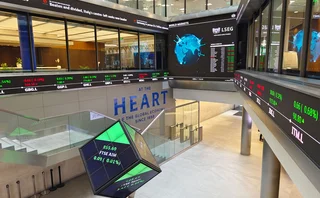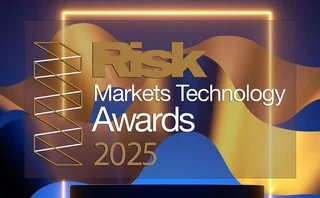
Rising stars in quant finance: Iuliia Manziuk and Bastien Baldacci
Risk Awards 2021: New research tackles ‘fundamental’ but largely ignored smart order routing problem

Shares of companies listed on multiple venues have persistently higher valuations than those with single listings. It is surprising, therefore, that cross-listings are often ignored by quants studying market micro-structure.
This year’s rising stars in quantitative finance – Bastien Baldacci, a PhD student at the École Polytechnique in Paris, and Iuliia Manziuk, a post-doctoral researcher at the same institution – propose a framework for deriving trading signals from multiple venues.
In Adaptive trading strategies across liquidity pools, due to be published in the journal Market Microstructure and Liquidity, they show how trading strategies can be optimised by taking into account the bid-ask spread and balance of buy and sell orders at each venue where a stock is listed. In the process, they enrich their strategy with new information, updating it as market dynamics change.
Their research has already drawn the attention of a large investor. “We are coding it and adjusting parameters to test which version of it is more effective,” says a representative of Qube Research and Technologies, a $7 billion quant hedge fund that was spun out of Credit Suisse in 2017. “The objective is, if the testing phase gives positive results, to implement it in our trading operations.”
Baldacci’s research focuses on optimal trading and market-making with the use of stochastic control, while Manziuk specialises in stochastic optimisation with machine learning tools. They have collaborated before. “In 2019, we wrote a paper together on market-making and regulation. Then we decided to turn to trading strategies, where we consider not only the strategic level but also execution tactics,” says Manziuk.
They formulated their solution as a stochastic control problem from the point of view of a trader who places limit and market orders in cross-listed stocks. Crucially, as well as the spread and imbalance of orders, the model takes into account the probability of limit orders being executed.
“Central to what we do is that spread and imbalance have a joint probability,” Baldacci explains. “If for the same stock there is a high imbalance on one venue and low imbalance on another, there can be statistical arbitrage between the two venues.”
The second part of their research deals with techniques for updating parameters. This ensures the model is working with the most recent information, and is performed in two steps. The first is a numerical exercise estimating the two parameters. This can be done in one of two ways: by solving the partial differential equation via a finite difference scheme; or by applying a deep reinforcement learning algorithm, which performs well in more complex situations where a stock trades on numerous venues.
Central to what we do is that spread and imbalance have a joint probability
Bastien Baldacci
“Adaptivity to market conditions through parameter updates, which can be easily accounted for in the proposed learning procedure, is an important part of the algorithm,” says Manziuk.
Mathieu Rosenbaum, professor of quantitative finance at the École Polytechnique, is Baldacci’s PhD supervisor – alongside Dylan Possamaï, a professor at ETH Zurich – and also oversees Manziuk’s post-doctoral research. He is also part of the selection committee for this award. To avoid any conflict of interest, Rosenbaum did not participate in the final voting.
Rosenbaum was instrumental in bringing Baldacci and Manziuk’s research to the attention of Qube. “Bastien, Iuliia and I presented some works on optimal trading in various kinds of environment – high-frequency estimation; machine learning methods; and market simulation – at Qube,” he says. “Not only were they interested in the subject, but they realised Iuliia and Bastien were very competent and would have fitted well with the project within their firm,” he explains.
Manziuk has been collaborating with Qube on the coding and testing of the model. As part of the partnership, Qube is financing some of École Polytechnique’s research projects.
The paper received high praise from Risk.net’s selection committee for this award.
Adaptivity to market conditions through parameter updates is an important part of the algorithm
Iuliia Manziuk
Vladimir Piterbarg, head of quantitative analytics and development at NatWest Markets, says: “Optimal trading on multiple venues is a very relevant topic to all algo market-making desks, and applicable to all markets. It’s not commonly treated as it is very complex, but the authors find an excellent balance between realism and tractability.”
Leif Andersen, global head of quantitative research at Bank of America, was also impressed by the novelty and relevance of the work. “The paper addresses the smart order routing problem, which is fundamental and yet barely recognised in the literature. It provides an interesting formalisation that has potential for useful extensions.”
Baldacci and Manziuk intend to further refine their work by incorporating the parameter updates into the model itself, rather than having this as a second step. “The Bayesian update of the market parameter cannot be included directly in the control problem because of its high dimensionality. When we are able to do it, it will be a major improvement,” says Baldacci.
Only users who have a paid subscription or are part of a corporate subscription are able to print or copy content.
To access these options, along with all other subscription benefits, please contact info@risk.net or view our subscription options here: http://subscriptions.risk.net/subscribe
You are currently unable to print this content. Please contact info@risk.net to find out more.
You are currently unable to copy this content. Please contact info@risk.net to find out more.
Copyright Infopro Digital Limited. All rights reserved.
As outlined in our terms and conditions, https://www.infopro-digital.com/terms-and-conditions/subscriptions/ (point 2.4), printing is limited to a single copy.
If you would like to purchase additional rights please email info@risk.net
Copyright Infopro Digital Limited. All rights reserved.
You may share this content using our article tools. As outlined in our terms and conditions, https://www.infopro-digital.com/terms-and-conditions/subscriptions/ (clause 2.4), an Authorised User may only make one copy of the materials for their own personal use. You must also comply with the restrictions in clause 2.5.
If you would like to purchase additional rights please email info@risk.net
More on Awards
Clearing house of the year: LCH
Risk Awards 2025: LCH outshines rivals in its commitment to innovation and co-operation with clearing members
Best use of machine learning/AI: CompatibL
CompatibL won Best use of machine learning/AI at the 2025 Risk Markets Technology Awards for its use of LLMs for automated trade entry, redefining speed and reliability in what-if analytics
Markets Technology Awards 2025 winners’ review
Vendors jockeying for position in this year’s MTAs, as banks and regulators take aim at counterparty blind spots
Equity derivatives house of the year: Bank of America
Risk Awards 2025: Bank gains plaudits – and profits – with enhanced product range, including new variants of short-vol structures and equity dispersion
Law firm of the year: Linklaters
Risk Awards 2025: Law firm’s work helped buttress markets for credit derivatives, clearing and digital assets
Derivatives house of the year: UBS
Risk Awards 2025: Mega-merger expected to add $1 billion to markets revenues, via 30 integration projects
Interest rate derivatives house of the year: JP Morgan
Risk Awards 2025: Steepener hedges and Spire novations helped clients navigate shifting rates regime
Currency derivatives house of the year: UBS
Risk Awards 2025: Access to wealth management client base helped Swiss bank to recycle volatility and provide accurate pricing for a range of FX structures







